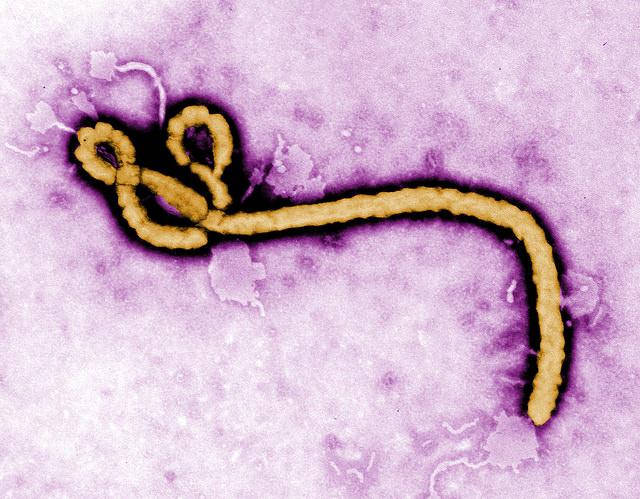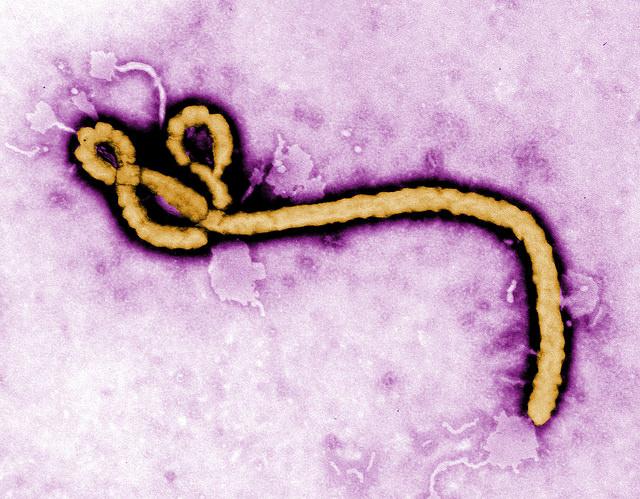
"The results for tolerability, safety, and the immune response to the vaccine candidate are very promising," explains Prof Marylyn Addo. The antibodies which developed against the virus were still detectable after six months. Addo is convinced, "With this, a single vaccine could provide lasting protection against Ebola." The infectious disease specialist, who works for the German Center for Infection Research at the University Medical Center Hamburg Eppendorf (UKE) in Hamburg, led the trial in Hamburg. A total of 158 healthy adult volunteers were tested in Hamburg, as well as at the partner sites in Geneva (Switzerland), Lambaréné; (Gabon) and Kilifi (Kenya).
The scientists involved are participants in VEBCON, a consortium of experts founded by the WHO, the goal of which is rapid and coordinated clinical testing of the Ebola vaccine in Africa. A vaccine is still urgently needed, since the current Ebola epidemic has not yet been completely defeated and future outbreaks cannot be ruled out.
About the trial
Across the four locations, a total of 158 healthy volunteers were vaccinated with increasing doses of the potential vaccine. A double-blind study was conducted in Geneva. The rVSV-ZEBOV vaccine that was used is an attenuated, genetically modified strain of vesicular stomatitis virus (VSV), which bears a surface protein of the Ebola virus. The goal is to help the vaccinated person's immune system produce antibodies to prevent an outbreak of the disease upon contact with the Ebola virus. For the first time, scientists have tested the vaccine's safety, tolerability and immune response in humans.
Important results
Safety and tolerability: No serious vaccine-related adverse reactions were observed; there were some cases of temporary mild fever and others of joint complaints. Since it is a live vaccine, small amounts of the vaccine virus were found in the blood, as expected, but only in the first few days following vaccination. Virus replication appears to be controlled and limited by the immune system. No viruses were detected in saliva and urine.
Effect on the immune system: In all participants, a single vaccine stimulated the immune system to produce antibodies specifically targeting the Ebola surface protein. The antibodies produced were able to inhibit the Ebola virus infections in vitro, and were still detectable after six months. The scientists evaluate the risk-benefit profile as positive.
Prof Stephan Becker, who analysed the immune responses of the volunteers in his laboratory at the Philipps-Universität Marburg is happy, "These results demonstrate that the new vaccine can potentially be used in future Ebola outbreaks." DZIF Professor Peter Kremsner from the University Hospital Tuebingen, who headed the trial in Gabon, explains, "The adverse reactions were moderate and within the limits of what can be expected when using live vaccines."
The pathway to the vaccine: The results are now being incorporated in further trials which are using the previously determined optimal vaccine dose and testing children in particular. These trials are taking place in Lambaréné, Gabon, amongst other places. In Guinea, the vaccine has also already been tested in a larger trial where people in contact with Ebola patients were vaccinated. The preliminary interim results have shown that the vaccine is effective. Approval by the American authority FDA is being sought for early 2017.
The German Center for Infection Research supported the preparation of the trials at the UKE in Hamburg and in Gabon and provided initial funding. The Federal Ministry of Health (BMG), and the British Wellcome Trust provided the funding for the clinical trial preparation and implementation. The Canadian Health Authority donated the vaccine candidate to the WHO, which then made it available for these trials. The development of the vaccine candidate was supported by the WHO. All parties involved thus responded quickly and jointly to the dramatic Ebola epidemic in West Africa. For the trial preparations, the DZIF scientists in Hamburg, Gießen-Marburg-Langen, and Tübingen worked closely with the Paul-Ehrlich-Institut (PEI), which, as a partner of the DZIF, supports research into new vaccine platforms. In Hamburg, the trial was conducted in close collaboration with the Heinrich Pette Institute and the Bernhard Nocht Institute.
Contact
Prof Marylyn Addo
University Medical Center Hamburg-Eppendorf (UKE)
German Center for Infection Research
Head of the trial in Hamburg
[email protected]
Prof Peter G. Kremsner
University Hospital Tübingen
German Center for Infection Research
Head of the trial in Gabon [email protected]
Prof Stephan Becker
University of Marburg
DZIF coordinator "Emerging Infections"
[email protected]
Publication
Selidji T. Agnandji, M.D.; Angela Huttner, M.D.; Madeleine E. Zinser M.D.; Patricia Njuguna M. M.D. et al.
Phase I Trials of rVSV Ebola Vaccine in Africa and Europe
New England Journal of Medicine, 2016 Apr 28. doi: 10.1056/NEJMoa1502924
###
Media Contact
Press Department
[email protected]
http://www.dzif.de/en/
The post Ebola vaccine: Promising phase I trials appeared first on Scienmag.





